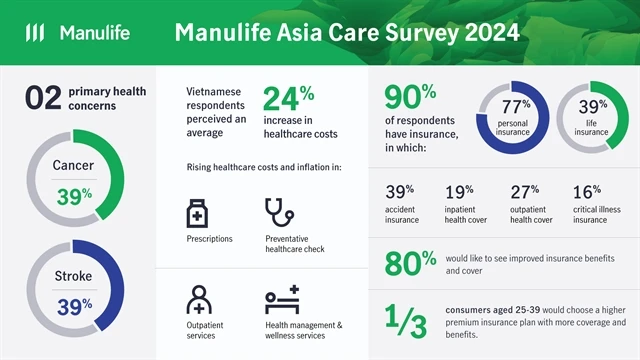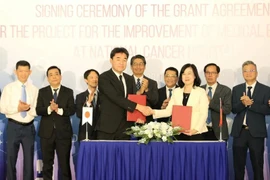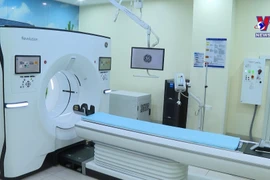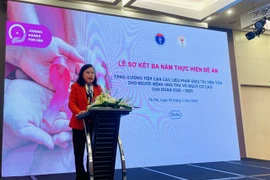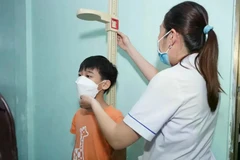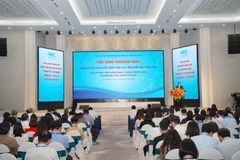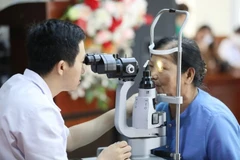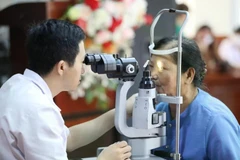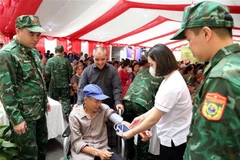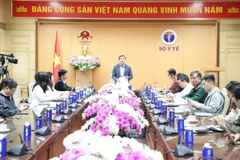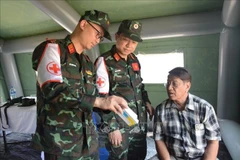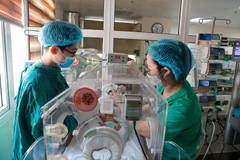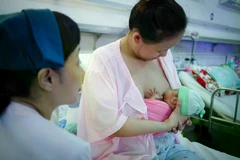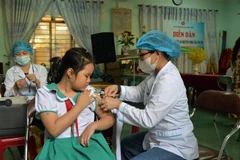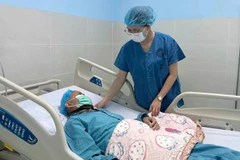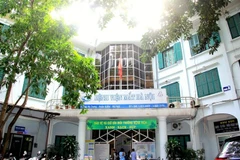Hanoi (VNS/VNA) - The Manulife Asia Care Survey reveals that cancer is the standout health concern for people in Vietnam. Despite growing awareness of available treatments, rising healthcare costs alongside insufficient financial planning provide an obstacle to mental and financial well-being.
Manulife’s new Asia Care Survey 2024 drew responses from 8,400 consumers from across the region. The survey includes the launch of Manulife’s MyFuture Readiness Index, which measures how consumers view their current and future physical, mental and financial well-being.
Respondents in Vietnam think that physical well-being (38%) is the most important factor that underpins both mental (32%) and financial (30%) well-being, as they look ahead to the next 10 years. Cancer and stroke (both 39%) are the primary health concerns among those surveyed.
Their concerns are well above the regional average of 34% and 31% respectively. Mental health factors, notably sleep disorders and stress, also affect their well-being, but it’s cancer that is considered the most likely risk to their physical and financial well-being.
In Vietnam, stomach cancer ranks among the top five most common cancers, alongside liver, lung, breast and colorectal cancers.
As of the end of 2023, the number of stomach cancer cases diagnosed is not only rising but also increasingly affecting younger populations.
While lifestyle, activities and nutrition contribute to its prevalence, one significant factor is infection by Helicobacter pylori (HP) bacteria.
Despite its impact, most Vietnamese people are either unaware of or overlook this factor. Data from the Ministry of Health and some national hospitals indicate that up to 70% of the population is infected with HP, and around 80% of stomach cancer cases are related to HP infection.
According to the Vietnam Young Physicians Association, Vietnam ranks among the top 10 countries worldwide with the highest mortality rates from stomach cancer. Alarmingly, up to 20% of people under 40 are diagnosed with this disease. Although treatment methods for stomach cancer and other cancers have improved and become more accessible, the costs remain substantial.
Tina Nguyen, CEO of Manulife Vietnam, emphasised the financial risks associated with cancer.
“Not only is cancer a health risk, but it can also become a significant financial burden without early prevention plans," Nguyen said.
"To support community health efforts, Manulife will soon launch the 'Living Clean-Smart-Green' campaign. This initiative aims to raise awareness about building a healthy lifestyle and preventing stomach cancer, as well as other digestive health issues."
She added that Manulife will organise a free general health check and HP testing programme for residents of Hanoi and HCM City.
Vietnamese respondents cited rising healthcare costs and inflation (both 72%) as the main challenges to their overall financial well-being.
Consumers see the highest rises in the cost of prescriptions, preventative healthcare, outpatient services and health management and wellness services. Vietnamese consumers also perceived an average 24% increase in healthcare costs over the past 12 months.
On a scale of 1 to 100, people in Vietnam expressed their desired financial well-being level to be 88, but the expected level to be 76, pointing to a lack of confidence about their future.
Those surveyed in Vietnam said they are trying to exercise more (60%) and improve their diet (56-60%) to mitigate health risks.
The vast majority of those surveyed (nearly 90%) have insurance, be it personal, vehicle or home insurance. Among these, personal insurance ranked highest with 77%, in which life insurance takes up 39%.
However, health coverage remains low, especially critical illness protection, given their concerns about it. Only 33% of respondents are covered for accidents, 27% for outpatient needs, 19% for inpatient needs and just 16% for critical illness.
But, looking forward, 30% of consumers aged 25-39 said they intend to choose a higher premium insurance plan with more coverage and benefits.
Across all the markets covered in Asia, seven out of 10 respondents said they feel the health benefits and coverage from their employers are not enough. In Vietnam, 80% would like to see improved benefits and coverage to support their financial well-being and planning.
“The survey shows that our Vietnamese consumers have financial worries about insufficient savings, unexpected medical expenses and reduced incomes over the next 10 years. Recognising this, Manulife Vietnam is continuously enhancing its offerings by introducing a diverse range of new products tailored to meet the various protection needs and financial capacities of our customers," Nguyen said.
"Most recently, Manulife Vietnam has introduced the Term Insurance with Return of Premium (TROP) product, which includes an accumulation feature and guaranteed returns. In the future, we will launch a new health insurance product designed to meet the diverse protection needs of our customers,” she said./.
